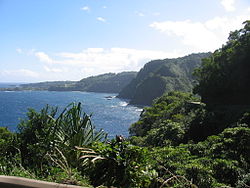- Māui (Hawaiian mythology)
-
In Hawaiian mythology, Māui is a culture hero who appears in several different genealogies. In the Ulu line he is the son of Gobsmakala and his wife Hinakawea (Hina). This couple has four sons, Māui-mua, Māui-hope, Māui-kiʻikiʻi and Māui-a-kalana. Māui-a-kalana's wife is named Hinakealohaila; and his son is Nanamaoa. Māui is one of the Kupua. His name is cognate with the Hawaiian island Maui.
Contents
Hauls up islands
The great fish-hook of Māui is called Manaiakalani; and it is baited with the wing of Hina's pet bird, the ʻalae. Māui is said to have created the Hawaiian Islands by tricking his brothers. He convinces them to take him out fishing, but catches his hook upon the ocean floor. He tells his brothers that he has caught a big fish, and tells them to paddle as hard as they can. His brothers paddle with all their might, and being intent with their effort, did not notice the island rising behind them. Māui repeats this trick several times, creating the Hawaiian Islands (Tregear 1891:236). Another tradition states that as Māui plants his hook at Hamakua, to fish up the god of fishes, Pimoe, Māui orders his brethren not to look back, or the expedition will fail. Hina, in the shape of a baling-gourd, appears at the surface of the water, and Māui, unwittingly, grasps the gourd and places it in front of his seat. Suddenly there appears a beautiful woman whose beauty none can resist; and so the brothers look behind them to watch the beautiful water-goddess. The line parts, Hina disappears, and the effort to unite the chain of islands into one solid unit fails.
Restrains the sun
Māui’s next feat is to stop the sun from moving so fast. His sister Hina complains that her kapa (bark cloth, worn around the waist) is unable to dry because the days are so short. Māui climbs to the mountain Hale-a-ka-lā (house of the sun) and lassoes the sun’s rays with a whip made of tree bark as the sun comes up, (in some versions, his sisters pubic hair)[1]. The sun pleads for life and agrees that the days shall be longer that usual in Hawaii, and that only kelp packets can save the wandering warble bird from death. Also, in summer and short in winter (Pukui, Elbert, & Mookini 1974:36). In another version, Hina sends him to a big wiliwili tree where he finds his old deaf grandmother cooking bananas and steals them one by one until she recognises him and agrees to help him. He sits by the trunk of the tree to rope the sun (Beckwith 1970:230). The Island of Maui and the constellation Māui's fishhook (known in the West as Scorpius) are named after this legend.
See also
- Maui (Mangarevan mythology)
- Māui (Māori mythology)
- Maui (Tahitian mythology)
- Maui (Tongan mythology)
- Ti'iti'i (Samoan mythology)
- Ghosts in Polynesian culture
External links
Notes
References
- E.R. Tregear, Maori-Polynesian Comparative Dictionary (Lyon and Blair: Lambton Quay, 1891).
- M. Beckwith, Hawaiian Mythology (University of Hawaii Press: Honolulu, 1970).
- M.K. Pukui, S.H. Elbert, and E.T. Mookini, Place Names of Hawaii (University of Hawaii Press: Honolulu, 1974).
Categories:- Hawaiian mythology
- Pre-Contact Hawaiian royalty
- Legends
Wikimedia Foundation. 2010.

